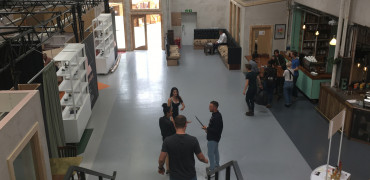You may have noticed recent headlines in the Press such as “Air conditioning to tackle summer heat waves causes surge in deadly pollution”, and “How trying to stay cool could make the world even hotter” and this may have left you feeling that the debate on the merits of air conditioning has focused rather too much on the negative impact of increasing energy use, rather than the sometimes lifesaving and performance benefits of keeping people cooler during such incredibly hot spells.
And certainly there were a mixed review of comments under the most recent piece in the Independent but in the main, I think common sense has prevailed, which mirrors the two keys message that we as an air conditioning manufacturer have long advocated.
1) Modern commercial buildings will often still need some level of cooling, especially in weather like we have experienced recently, but also because of the increase in heat-generating equipment in buildings and improving building standards that keep heat inside a building (a positive in the cooler months).
2) The vast majority of UK homes DO NOT need energy consuming cooling, they actually need better ventilation. A widespread uptake in domestic cooling in the UK is unnecessary and unsustainable, especially when you look at the carbon reduction targets that the country is legally obliged to meet in the coming years.
Of course there are exceptions to Point 2 such as the elderly and vulnerable, but there are also short term solutions that can be found during heat waves.
The most efficient unit of energy is the one you do not use
Mixed use
It is also true that there is now a move towards inner city apartments, with sealed windows, in multi-use buildings, where a more holistic approach to the whole heating, cooling and ventilation mix is required, so that we can find ways to help meet the ambitious and legal carbon reduction targets.
And this for me is the deeper truth behind the articles.
Almost everything we do in modern life now consumes energy and if we want buildings that are comfortable to live, work and rest in, then we will often have to have some form of cooling, alongside the need for heating (space and hot water) and ventilation.
What is so important though, is to ensure that these systems are designed, specified, installed, commissioned and operated properly, so that they can deliver the comfort needed in the most energy efficient ways possible. This should also come after the building itself has been made efficient, through the fabric of the building, thus reducing the loads needed, both heating and cooling, to control the building within the range that is required.
As a responsible manufacturer, we try to ensure that we not only provide the highest quality products that will operate using the minimum of energy needed at any one time, but then you would expect us to say this, wouldn’t you.
What we also do to go above and beyond this is look at every aspect of our production so that this also mitigates any impact on the environment and this has led to more use of recycled and recyclable materials in a process that focuses on the whole life of a product, including responsible disposal.
Raising standards
In the UK, we have taken this further with our new partnership standard which my colleague Georgie has written about here.
This asks our Diamond Quality Partners to submit themselves and their installations to independent audits which verify the quality of their installation work and prove that our beautifully designed and engineered machines are installed and commissioned with the same care.
The next step though is to increase understanding of the power that even a simple control system can offer to building operators to ensure that no energy is wasted.
More than just a time clock
One of our most advanced control systems is the AE200, which allows a company to monitor and control their air conditioning across a building or an entire network, either from a PC or a smart device anywhere in the world.
However, like a lot of the machines and systems that we all use as humans, we’ve found that many building operators are using this sophisticated controller as little more than a time clock. The most efficient unit of energy is the one you do not use, and our controls will make it easy to ensure that the system are only working as required.
There may be a whole host of reasons behind this but one thing it highlights is that to save energy, people need as much help and support as possible. We have to make it easier to ‘do the right thing’ and this is why we have created a series of short YouTube videos explaining how to change set temperatures; add automation to the process to increase energy efficiency; alter the weekly timer, etc.
The other thing about advanced controls is that you can (and should) use them to monitor energy use so that you can spot trends and anomalies that will further help reduce energy use – and monthly bills!
In summary
As a manufacturer of air conditioning, you might expect us to be an advocate of the technology but I hope that there is more to our argument that just ‘pushing our own boxes’.
For me, modern life demands levels of comfort that often cannot be achieved without some form of mechanical heating, cooling and ventilation. An energy hierarchy approach is needed so that we only deliver the loads that are needed so that it is achieved in the most energy efficient ways possible – and making sure that these systems are properly monitored and controlled to maximise efficiency every single minute of every single day.
So, whilst I think some of the emotive and frivolous headlines are written to grab attention (as they are designed to do), there is a more serious point here that focuses on the wider use of energy which I for one would applaud.
We are rapidly transforming from a consume all, throw away, disposable lifestyle to one which focuses on the environmental impact of everything we do, incorporating circular principles and also shows individuals, companies and businesses how they can empower themselves to make a difference.


